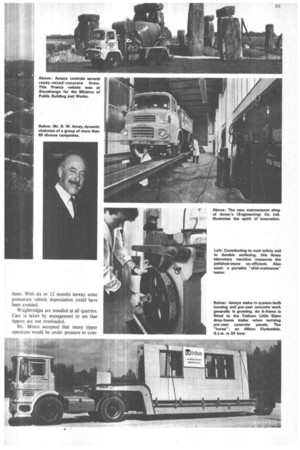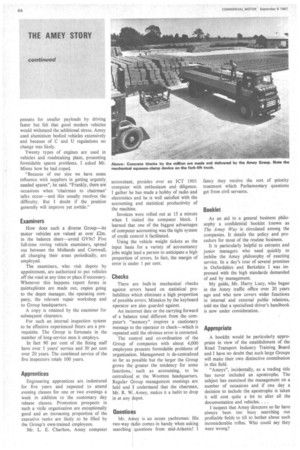By JOHN DARKER,Ammm R OAD TRANSPORT is a major factor in
Page 64

Page 65

Page 66

If you've noticed an error in this article please click here to report it so we can fix it.
the growth and continued prosperity of the Amey Group of companies. Enlightened managerial techniques can also be identified as contributory success factors.
The Group, founded by Mr. W. C. Amey and now under the chairmanship of his son, Mr. R. W. Amey, is in the big league financially. In June, when the directors recommended for the second year running a total dividend of 10 per cent, the authorized capital was increased to £5,300,000.
The Group associates more than 60 diverse companies broadly classified in five divisions extractives, road surfacing and civil engineering, concrete, industrial housing, and storage, distribution and transport.
The largest, the extractives division, exploits sand, gravel and aggregates over a wide area of central and Southern England. And a deep-dredging vessel Pen Avon was commissioned last year to add its quota of gravel from beneath the English Channel.
Amey signs are familiar on motorway construction jobs. Recent work by this division includes the strengthening and resurfacing of 18 miles of M1 in Northants and Bucks and major jobs on M6 Midlands link.
The vast engineering organization involved in motorway construction tends to be overlooked by the public. Providing a mobile asphalt factory for surfacing four miles of MI now under construction at Wakefield /Ossett is the sort of contribution the Amey organization is now equipped to provide.
This asphalt plant with a daily output of 1,800 tons is scheduled to produce 125,000 tons before it is dismantled. A great many plated tipper loads!
Thorough To see the thoroughness with which Amey supports its major activities I was most interested to visit its road surfacing research establishment. I am familiar with quality control techniques in engineering but I was frankly surprised to learn that the
quality of road-surfacing materials can vary widely.
The wearing and anti-skid properties of surfacing materials produced within the Group are tested. So are samples of bought out materials—to ensure that specified contract standards are adhered to.
Influence
Groups such as Amey operating a thousand or more vehicles exercise a marked influence on the design and construction methods of their vehicles and equipment. Mr. A. G. Minns, director of Amey's (Engineering) Ltd., stressed the close technical relationship established with suppliers.
Over the years, standardized equipment has been critically examined after arduous working tests and design improvements called for.
Mr. Minns welcomed• the Minister's plating proposals—he felt they were overdue—though he wished the industry had been given a little more time to implement them. With six or 1,2 months leeway some premature vehicle depreciation could have been avoided.
Weighbridges are installed at all quarries. Care is taken by management to see that tippers are not overloaded.
Mr. Minns accepted that many tipper operators would be under pressure to corn
pensate for smaller payloads by driving faster but felt that good modern vehicles would withstand the additional stress. Amey used aluminium bodied vehicles extensively and because of C and U regulations no change was likely.
Twenty types of engines are used in vehicles and roadmaking plant, presenting formidable spares problems. I asked Mr. Minns how he had coped.
"Because of our size we have some influence with suppliers in getting urgently_ needed spares", he said. "Frankly, there are occasions when 'chairman to chairman' talks occur—and this usually resolves the difficulty. But I doubt if the position generally will improve yet awhile."
Examiners How does such a diverse Group—its motor vehicles are valued at over £2m. in the balance sheet—avoid GV9s? Five full-time roving vehicle examiners, spread out between the Midlands and Cornwall, all changing their areas periodically, are employed.
The examiners, who visit depots by appointment, are authorized to put vehicles off the road at any time or place if necessary. Whenever this happens report forms in quintuplicate are made out, copies going to the depot manager, the operating company, the relevant repair workshop and to Group headquarters.
A copy is retained by the examiner for subsequent clearance.
For such an internal inspection system to be effective experienced fitters are a prerequisite. The Group is fortunate in the number of long-service men it employs.
In fact 90 per cent of the fitting staff have over 5 years' service and 30 per cent over 20 years. The combined service of the five inspectors totals 100 years.
Apprentices Engineering apprentices are indentured for five years and expected to attend evening classes for one or two evenings a week in addition to the customary day release classes. Promotion prospects in such a virile organization are exceptionally good and an increasing proportion of the executive ranks are likely to be filled by the Group's own-trained employees.
Mr. L. E. Charlton, Amey computer accountant, presides over an ICT 1901 computer with enthusiasm and diligence. I gather he has made a hobby of radio and electronics and he is well satisfied with the accounting and statistical productivity of the machine.
Invoices were rolled out at 15 a minute when I visited the computer block. I learned that one of the biggest advantages of computer accounting was the tight system of credit control it facilitated.
Using the vehicle weight tickets as the input basis for a variety of accountancy jobs might lead a person to anticipate a high proportion of errors. In fact, the margin of error is under 1 per cent.
Checks There are built-in mechanical checks against errors based on statistical probabilities which eliminate a high proportion of possible errors. Mistakes by the keyboard operator are also guarded against.
An incorrect date or the carrying forward of a balance total different from the computer's "memory" inspires a cautionary message to the operator to check—which is repeated until the obvious error is corrected.
The control and co-ordination of the Group of companies with about 4,000 employees presents formidable problems of organization. Management is de-centralized so far as possible but the larger the Group grows the greater the tendency for some functions, such as accounting, to be centralized at the Wootton headquarters. Regular Group management meetings are held and I understand that the chairman, Mr. R. W. Amey, makes it a habit to drop in at any depot.
Questions Mr. Amey is an ocean yachtsman. His two-way radio comes in handy when asking searching questions from mid-Atlantic! I fancy they receive the sort of priority treatment which Parliamentary questions get from civil servants.
Booklet As an aid to a general business philosophy a confidential booklet known as The Amey Way is circulated among the companies. It details the policy and procedure for most of the routine business.
It is particularly helpful to entrants and junior managers who need quickly to imbibe the Amey philosophy of exacting service. In a day's tour of several premises in Oxfordshire and Berkshire I was impressed with the high standards demanded of and by management.
My guide, Mr. Harry Lucy, who began in the Amey traffic office over 20 years ago and who now covers wider functions in internal and external public relations, told me that a specialized driver's handbook is now under consideration.
Appropriate A bookret would be particularly appropriate in view of the establishment of the Road Transport Industry Training Board and I have no doubt that such large Groups will make their own distinctive contribution in this field.
"Ameys", incidentally, as a trading title has never included an apostrophe. The subject has exercised the management on a number of occasions and if one day a decision to include the apostrophe is taken it will cost quite a lot to alter all the documentation and vehicles. . . .
I suspect that Amey directors so far have always been too busy searching out profitable fields to till to bother about such inconsiderable trifles. Who could say they were wrong?




















































































































